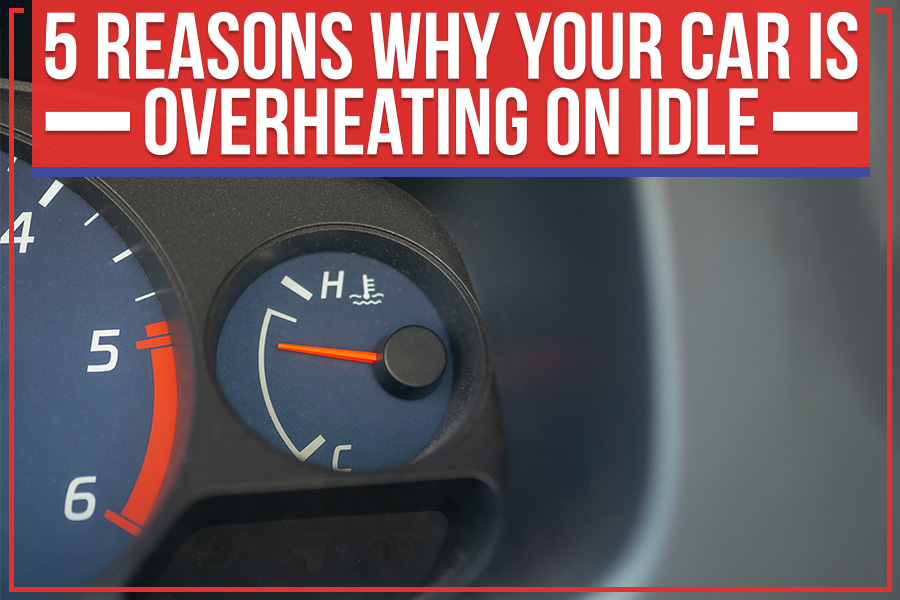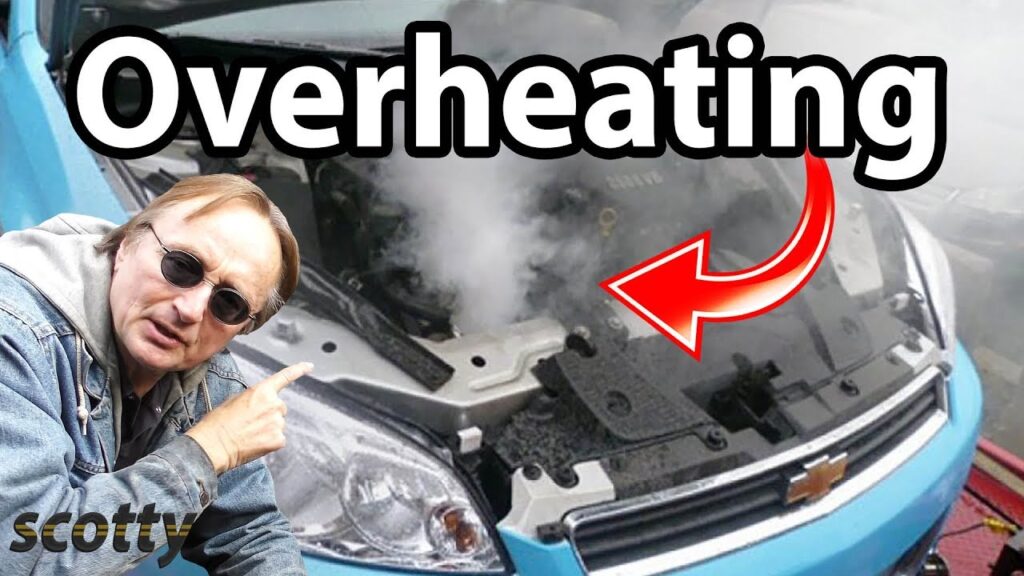My car is likely overheating due to a problem with its cooling system. The cooling system helps regulate the temperature of the engine by circulating coolant throughout it, and if something goes wrong with this system, then the engine can overheat. Common causes for an overheating issue include a faulty thermostat, blocked radiator, broken/loose fan belt or low coolant levels.
If your car starts to overheat it’s important to stop driving and have it looked at as soon as possible in order to prevent further damage from occurring. A qualified mechanic will be able to diagnose and repair any underlying issues causing your vehicle to overheat.
One of the most common reasons why your car may be overheating is because there isn’t enough coolant in the system. If you don’t have enough coolant, it won’t be able to do its job properly and will cause the engine to overheat. Additionally, if there are any issues with your radiator or cooling fan, these can also contribute to an overheating issue.
It’s important that you check fluid levels regularly as well as inspect hoses and other components associated with the cooling system for any signs of wear or damage so you can prevent overheating from occurring.
How Do You Fix a Car That Overheats?
If your car is overheating, you need to take action quickly. The first step is to pull over and turn off the engine as soon as possible. If the radiator cap is still cool enough to touch, open it and check the level of antifreeze.
If it’s low, add more until it reaches the full line on the side of the reservoir tank. Check for any visible leaks or damage in both hoses running from your radiator; if there are any issues replace them immediately. Then start up your car again, but look out for signs that it may be overheating such as steam coming from under the hood or a temperature gauge reading higher than normal.
If this occurs, shut down your car and wait at least 10 minutes before checking things further.
What are 3 Simple Things to Check If Your Car is Overheating?
If your car is overheating, it’s important to take care of the problem right away. To help you figure out what may be causing the issue, here are 3 simple things to check:
1) Make sure that the coolant level in your vehicle is at an appropriate level.
If it’s too low, top it off with water or a special antifreeze mixture and make sure there are no leaks.
2) Inspect all belts and hoses for any signs of wear or damage such as cracking, fraying or bulging. Any damaged components need to be replaced promptly before they cause further issues.
3) Check that the radiator fan is operating properly by turning on your engine and feeling if there’s air blowing through the grill near where the fan is located. If not, then you may need a new fan motor or some other repair work done on your cooling system.
Taking these steps can help keep your car from overheating and ensure safe operation for many miles down the road!
Is It Safe to Drive a Car That Overheats?
No, it is not safe to drive a car that overheats. Excessive heat can cause serious damage to your vehicle’s engine and other components. Overheating can lead to the breakdown of lubricants and sealants, causing seals or gaskets to fail, resulting in leaks of oil or coolant.
In extreme cases, this can cause the engine block itself to crack due to heat expansion. If you suspect your car is starting to overheat, pay attention for any unusual smells coming from the engine bay as these are signs of an impending failure. To avoid further damage caused by overheating it’s best practice – if possible – park up as soon as possible in a safe place and turn off the engine completely.
If you have no choice but to continue driving then make sure you check the temperature gauge often and reduce speed until you get home/to a garage where repairs can be made safely and efficiently by qualified technicians with access to specialist tools such as pressure testers for diagnostics purposes.
What Causes a Car to Suddenly Overheat?
Car overheating is a common problem that can be caused by several factors. The most common cause of car overheating is lack of proper maintenance, such as not changing the oil regularly or not checking the coolant levels. When these fluids are low, they can no longer absorb and transfer heat away from the engine efficiently, causing it to overheat.
Another issue that can lead to sudden car overheating is an obstruction in the radiator system. If there’s something blocking air flow or preventing coolant from circulating properly through the system, then your car will eventually overheat as well. Additionally, worn out belts and hoses may also contribute to excessive heat buildup in cars because they do not function optimally anymore.
Finally, driving with a malfunctioning thermostat can also cause your vehicle’s engine temperature to rise quickly since it cannot regulate its own temperature effectively when it fails.

Credit: www.feldmanwoodhaven.com
Temporary Fix for Overheating Car
If your car is overheating, you can take some temporary measures to reduce the heat until you get it to a mechanic. Try turning off the air conditioning and opening windows for ventilation. You should also avoid using cruise control if possible as this will make your engine work harder and generate more heat.
If necessary, you can try running the heater on full blast in order to draw away some of the excess heat from under the hood. Lastly, keep an eye on your temperature gauge and be prepared to pull over if it continues to rise beyond a safe level.
Engine Overheating But Coolant Full
If your engine is overheating, but the coolant is full, then you may have a more serious problem than a simple lack of fluid. A common cause for an engine overheat in this situation could be due to a broken thermostat or defective radiator fan. Additionally, there could be issues with air flow restrictions that prevent proper cooling of the coolant system or even faulty sensors which are not accurately measuring and controlling temperatures.
It’s best to consult with an experienced mechanic who can properly diagnose and repair any underlying problems causing your engine to overheat while the coolant is still full.
What are 10 Common Causes of Overheating
Overheating can be a sign of an issue with your vehicle, and there are many common causes. These include: low coolant levels, radiator blockage or restrictions, thermostat failure, water pump failure, faulty fan clutch or cooling fan motor issues, clogged air filters or radiators, poor airflow to the engine bay due to a blocked grill opening or radiator core fins being packed with debris from the road surface. Other potential culprits include worn timing belts and hoses that have deteriorated over time allowing coolant leaks; incorrect spark plug gaps; leaking head gaskets; broken serpentine belts; and oil level too high in relation to its viscosity.
It is important to identify these problems early on as they can lead to costly repairs if left unaddressed for too long.
Car Overheating Then Going Back to Normal
If your car is overheating and then going back to normal, it could be a warning sign that something is wrong with your vehicle’s cooling system. It’s important to have the issue checked out by a qualified mechanic as soon as possible, since an overheated engine can cause serious damage if left unchecked. Additionally, check for any leaks in the coolant hoses or other components of the cooling system before driving again; if you notice anything amiss, get it fixed promptly.
Symptoms of Engine Damage from Overheating
Engine damage from overheating can be difficult to detect and diagnose, but some warning signs may include smoke coming from the engine, an unusual smell or sound emanating from under the hood, and a temperature gauge that is higher than normal. Engine performance will also suffer as the car may hesitate when accelerating or even stall completely. If left unaddressed, these symptoms can lead to severe engine damage such as warped cylinder heads, blown gasket seals, bent connecting rods, cracked pistons and more.
How Far Can You Drive an Overheating Car
You should never attempt to drive a car that has overheated. The engine could suffer irreversible damage, so the best thing you can do is pull over and turn off the vehicle as soon as possible. If you are already on the road, try to get to a safe location quickly by driving slowly and gently until you reach your destination.
Once at your destination, you must take steps to diagnose what caused the issue before attempting any further travel with an overheating car.
What Happens When a Car Overheats
When a car overheats, the engine temperature rises too high and can cause major damage to your vehicle’s engine. In order to prevent this from happening, it is important to make sure that the coolant levels are adequate and that all belts and hoses are in good working order. If your car does overheat, you should pull over immediately as continuing to drive could lead to permanent damage or even complete engine failure.
To cool down an overheated engine safely, be sure not to open the hood until after it has had time for the excess heat escape through natural air flow.
What Happens If Your Car Overheats And You Keep Driving
If your car overheats and you keep driving, it can cause the engine to seize. This means that the pistons will lock up in place, leading to a costly repair or even an irreparable engine failure. Additionally, when a car is overly hot it can damage other components such as gaskets and hoses which may lead to further expensive repairs.
Therefore, if your vehicle begins to overheat it is important to pull over immediately and investigate the issue before continuing on with your journey.
Conclusion
In conclusion, it is important to be aware of the signs and symptoms that your car may be overheating so that you can take action quickly. If you are having trouble diagnosing or repairing the issue yourself, it is best to consult a professional mechanic who will be able to determine the exact cause of your car’s overheating problem. With regular maintenance and proper care, you can help keep your car running smoothly for many years to come.







